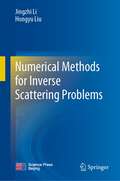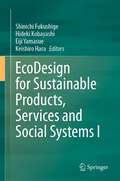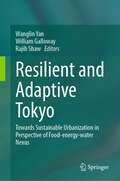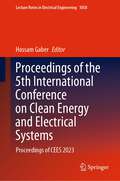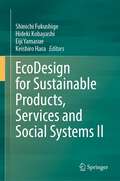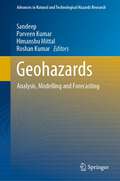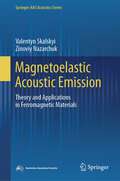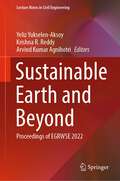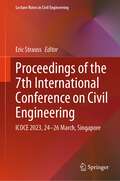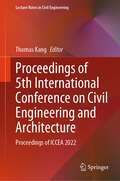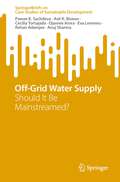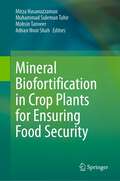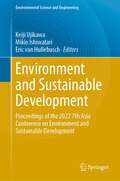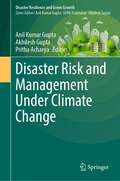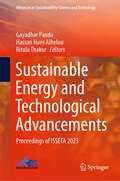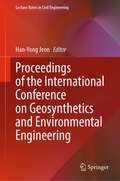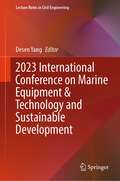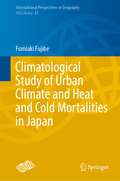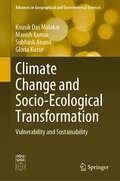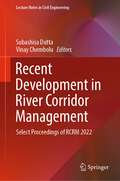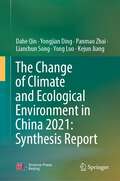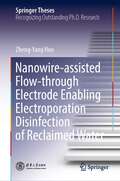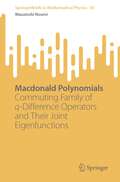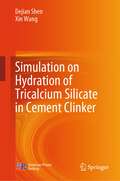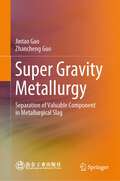- Table View
- List View
Numerical Methods for Inverse Scattering Problems
by Jingzhi Li Hongyu LiuThis book highlights the latest developments on the numerical methods for inverse scattering problems associated with acoustic, electromagnetic, and elastic waves. Inverse scattering problems are concerned with identifying unknown or inaccessible objects by wave probing data, which makes possible many industrial and engineering applications including radar and sonar, medical imaging, nondestructive testing, remote sensing, and geophysical exploration. The mathematical study of inverse scattering problems is an active field of research. This book presents a comprehensive and unified mathematical treatment of various inverse scattering problems mainly from a numerical reconstruction perspective. It highlights the collaborative research outputs by the two groups of the authors yet surveys and reviews many existing results by global researchers in the literature. The book consists of three parts respectively corresponding to the studies on acoustic, electromagnetic, and elastic scattering problems. In each part, the authors start with in-depth theoretical and computational treatments of the forward scattering problems and then discuss various numerical reconstruction schemes for the associated inverse scattering problems in different scenarios of practical interest. In addition, the authors provide an overview of the existing results in the literature by other researchers. This book can serve as a handy reference for researchers or practitioners who are working on or implementing inverse scattering methods. It can also serve as a graduate textbook for research students who are interested in working on numerical algorithms for inverse scattering problems.
EcoDesign for Sustainable Products, Services and Social Systems I
by Shinichi Fukushige Hideki Kobayashi Eiji Yamasue Keishiro HaraThis 2-volume book highlights cutting-edge ecodesign research and covers broad areas ranging from individual product and service design to social system design. It includes business and policy design, circular production, life cycle design and management, digitalization for sustainable manufacturing, user behavior and health, ecodesign of social infrastructure, sustainability education, sustainability indicators, and energy system design. Featuring selected papers presented at EcoDesign 2021: 12th International Symposium on Environmentally Conscious Design and Inverse Manufacturing, it also includes diverse, interdisciplinary approaches to foster ecodesign research and activities. In the context of Sustainable Development Goals (SDGs), in particular SDG 12 (Responsible Consumption and Production), it addresses design innovations for sustainable value creation, considering technological developments, legislation, and consumer lifestyles. Further, the book discusses the concept of circular economy, which aims to develop circular business models for resource efficient society by taking advantage of digital technologies including artificial intelligence, internet of things, digital twin, data analysis and simulation. Written by experts from academia and industry, Volume 1 highlights sustainable design such as product and process design, collaborative design, sustainable innovation, digital technologies, design methodology for sustainability, and energy system design. The methods, tools, and practices described are useful for readers to facilitate value creation for sustainability.
Resilient and Adaptive Tokyo: Towards Sustainable Urbanization in Perspective of Food-energy-water Nexus
by Wanglin Yan William Galloway Rajib ShawOur cities, and the systems that support them, have not been designed to address the FWE nexus. There exist gaps in awareness of the role and impacts of climate change. Improving communication among stakeholders with the support of scientific evidence is the key to narrowing the gaps. This book approached this issue with a multidisciplinary and transdisciplinary moveable nexus approach through the lens of FEW nexus under the project of the Sustainable Urbanization Global Initiative of Belmont Forum. It presents a collection of evidence/science-based planning decisions and participatory practices by using Tokyo as the focal area. It visualizes the stock and flow of the Food-Water-Energy (FEW) supporting the world’s largest metropolitan area, explores how the actors have worked together to secure the resilience and sustainability of resources, and demonstrates the potential of resources in making the city adaptive to climatic and social changes. It is designed for researchers in urbanization, nexus research, urban design research, environment, disaster risk reduction, and climate change studies, and can be used as a textbook for university courses. It is also a useful tool for practitioners and policymakers in applying collective knowledge to policy and decision-making.
Proceedings of the 5th International Conference on Clean Energy and Electrical Systems: Proceedings of CEES 2023 (Lecture Notes in Electrical Engineering #1058)
by Hossam GaberThis book provides readers with peer-reviewed research papers presented at the 5th International Conference on Clean Energy and Electrical Systems held in Tokyo, Japan, from April 1 to 4, 2023. This proceedings mainly covers theoretical, technical, and practical methods and practices on clean energy and electrical systems. And it includes nuclear energy and "renewable energy." With the continuous growth of energy demand and the increasing awareness of environmental protection in countries around the world, it is urgent and imperative to establish a clean energy innovation research and development, promotion, and application system. The book also covers electricity, fuel, thermal, transportation, and water infrastructures and their development and deployment in different regions around the world. The book includes future development trends with analysis of lifecycle and economical models for successful implementation projects.
EcoDesign for Sustainable Products, Services and Social Systems II
by Shinichi Fukushige Hideki Kobayashi Eiji Yamasue Keishiro HaraThis 2-volume book highlights cutting-edge ecodesign research and covers broad areas ranging from individual product and service design to social system design. It includes business and policy design, circular production, life cycle design and management, digitalization for sustainable manufacturing, user behavior and health, ecodesign of social infrastructure, sustainability education, sustainability indicators, and energy system design. Featuring selected papers presented at EcoDesign 2021: 12th International Symposium on Environmentally Conscious Design and Inverse Manufacturing, it also includes diverse, interdisciplinary approaches to foster ecodesign research and activities. In the context of Sustainable Development Goals (SDGs), in particular SDG 12 (Responsible Consumption and Production), it addresses design innovations for sustainable value creation, considering technological developments, legislation, and consumer lifestyles. Further, the book discusses the conceptof circular economy, which aims to develop circular business models for resource efficient society by taking advantage of digital technologies including artificial intelligence, internet of things, digital twin, data analysis and simulation. Written by experts from academia and industry, Volume 2 focuses on the sustainability assessment of product lifecycle, waste management, material circularity and energy efficiency, food and agriculture, user behavior and health, and transportation. The methods, tools, and practices described are useful for readers to facilitate value creation for sustainability.
Geohazards: Analysis, Modelling and Forecasting (Advances in Natural and Technological Hazards Research #53)
by Sandeep Parveen Kumar Himanshu Mittal Roshan KumarThis book presents a comprehensive analysis of diverse aspects of geohazards. The growing vulnerability and exposure to failures in risk reduction and policy-making increases the severity of geohazard impacts by many folds. Therefore, detailed geohazard analysis, modelling and forecasting are needed to reduce the impacts of extreme events.An interdisciplinary approach to hazard mitigation provides an advanced tool for risk reduction. The book thus summarizes recent modelling and analysis techniques for hazard assessment and risk mitigation. Topics discussed in the book are hazard and risk associated with earthquakes, vulnerability assessment for landslides and avalanches, the assessment of tsunami risk in coastal regions, the implementation of early warning systems to prevent catastrophic consequences, climate change risk modelling and risk communication. The convergent approach with the aspects of natural, engineering, and social sciences attracts a vast audience working to advance disaster science. This book also significantly facilitates the acquisition of policy-relevant knowledge for risk reduction, which is beneficial to the general public.
Magnetoelastic Acoustic Emission: Theory and Applications in Ferromagnetic Materials (Springer-AAS Acoustics Series)
by Valentyn Skalskyi Zinoviy NazarchukThe book presents theoretical and experimental studies to establish the relationship between volume jumps of the 90° domain wall in a ferromagnetic material and the magnitude of the half-space surface displacement caused by it. A method of evaluating the influence of the external magnetic field on the stress intensity factor at the tip of the crack-like defects in ferromagnets is discussed. The influence of hydrogen on the generation of magneto-elastic acoustic emission signals of ferromagnets is described. The features of magneto-elastic acoustic emission due to the presence of plastic deformation, structural changes, and volumetric damage in such structural materials are shown.
Sustainable Earth and Beyond: Proceedings of EGRWSE 2022 (Lecture Notes in Civil Engineering #370)
by Yeliz Yukselen-Aksoy Krishna R. Reddy Arvind Kumar AgnihotriThis book presents select proceedings of the Third International Conference on Environmental Geotechnology, Recycled Waste Materials and Sustainable Engineering (EGRWSE-2022). It covers state-of-the-art research on environmental geotechnology, sustainability, and use of recycled waste materials for civil infrastructure along with latest accomplishments, trends, concerns, innovations, practical challenges encountered, and the solutions adopted in this field. Given the contents, this book is useful for researchers, engineers, and professionals working in the areas of geoenvironmental engineering, waste management, and sustainable engineering and associated fields.
Proceedings of the 7th International Conference on Civil Engineering: ICOCE 2023, 24–26 March, Singapore (Lecture Notes in Civil Engineering #371)
by Eric StraussThis book contains research papers presented at the 7th International Conference on Civil Engineering, which was held in Singapore from 24-26 March 2023. Significant results contained in the book show the importance of technology in solving engineering issues throughout the world. Highlighted topics include climate change, disaster relief, resilience, pollution control and management techniques for construction, mitigation and adaptation. Many techniques are utilized in a variety of contexts to solve engineering and urban management problems in both developed and developing countries. This volume consists of refereed submissions authored by a wide variety of international researchers and practitioners from many perspectives discussing emerging issues in civil and environmental engineering. Practical solutions to worldwide issues in hazard mitigation, pollution control, transportation infrastructure and energy production are emphasized. The chapters provide an in-depth look at current issues in these areas of engineering that should benefit interested individuals at all levels of expertise.
Proceedings of 5th International Conference on Civil Engineering and Architecture: Proceedings of ICCEA 2022 (Lecture Notes in Civil Engineering #369)
by Thomas KangThis book states that the proceedings gathers selected papers from 2022 5th International Conference on Civil Engineering and Architecture (ICCEA 2022), which was held in Hanoi, Vietnam on December 16-18, 2022. The conference is the premier forum for the presentation of new advances and research results in the fields of theoretical, experimental, and practical civil engineering and architecture. And this proceedings from the conference mainly discusses architectural design and project management, environmental protection and spatial planning, design and analysis of building materials, and structural engineering and safety. And these materials can be useful and valuable sources for researchers and professionals working in the field of civil engineering and architecture.
Off-Grid Water Supply: Should It Be Mainstreamed? (SpringerBriefs on Case Studies of Sustainable Development)
by Pawan K. Sachdeva Asit K. Biswas Cecilia Tortajada Ojasvee Arora Eva Leneveu Rehan Adamjee Anuj SharmaThis book highlights unique and deeper insights into the operations of off-grid water supply business models and the policy implications that they raise. The two key research questions of the report are as follows: 1) What is the efficacy and sustainability of the off-grid model of safe water availability and/or delivery to consumers who don’t have piped water supply? 2) What are the key policy considerations for planning a successful off-grid model of safe water delivery? Through the Four-Domain Framework, this book does the gap analysis of the physical, operational, financial, and institutional domains of the few off-grid water operators in cross-country case studies. It also includes a detailed financial analysis of the capital costs as well as operations and maintenance costs of the different off-grid water supply models compared to some of the piped water supply models. The final discusses the need to acknowledge off-grid water solutions in urban water policies, especially for the economically weaker sections. The universal coverage of all by the piped water is an ultimate goal of any water policy; however, in the interim, there is a need to put more emphasis on off-grid water solutions.
Mineral Biofortification in Crop Plants for Ensuring Food Security
by Mirza Hasanuzzaman Muhammad Suleman Tahir Mohsin Tanveer Adnan Noor ShahThis book provides a comprehensive summary of the recent advances in the biofortification of plants under climate change and how it affects food security globally. The need for mineral biofortification to eradicate or alleviate malnutrition through sustainable agriculture is also discussed. Biofortification of edible plants is considered the most appropriate approach to alleviate nutritional problems and nutrient deficiencies. In contrast, biofortification focuses on improving the nutritional content of the region's current agricultural biodiversity while preserving its habits and customs. Emphasis is also placed on recent advances and developments in omics, particularly metabolomics and related techniques, to unravel the potential alterations in plants caused by biofortification. The book brings together eminent scientists to present the latest developments in the field. This timely publication addresses practical scenarios of bio-fortified food production and climate change. The book focuses on the methods, techniques, and environmental changes used to enhance and improve agricultural products. This book is one of the first to provide information on the use of modern biotechnologies to modify crops for health benefits. It also examines the mechanisms of the plant responses to genetically induced biofortification, the production and responses of fortified plants under climate change, and their effects on food security. The book will be useful for students and researchers, especially crop scientists, environmental scientists, biotechnologists, botanists, and agronomists, to understand the techniques and mechanisms of biofortification, and responses of biofortified plants under climate change.
Environment and Sustainable Development: Proceedings of the 2022 7th Asia Conference on Environment and Sustainable Development (Environmental Science and Engineering)
by Keiji Ujikawa Mikio Ishiwatari Eric Van HullebuschThis book presents selected papers from the 2022 7th Asia Conference on Environment and Sustainable Development, which was held in Kyoto, Japan, November 4–6, 2022. The event was co-sponsored by the International Network for Environmental and Humanitarian Cooperation, and technically supported by Yokohama National University and the National Institute for Environmental Studies, Japan. The book focuses on environmental restoration and ecological engineering, global environmental change and ecosystems management, environmental dynamics, wastewater and sludge treatment, air pollution and control, and environmental sustainability. The volume is a valuable resource for those in both academia and industry.
Disaster Risk and Management Under Climate Change (Disaster Resilience and Green Growth)
by Anil Kumar Gupta Akhilesh Gupta Pritha AcharyaThis contributed volume is focused on SDG 3, 6, 7 ,9, 11, 15, and it covers extensive knowledge on damage and loss contexts of climate change in a developing country. India’s vast landscape with its diversity of eco-geo-physiography, socio-cultural, and developmental settings, coupled with climate change and anthropogenic factors, makes it one of the most disaster-prone countries of the world and, thus, representing almost all the disasters and extreme events associated with climate change, variability, and weather phenomenon. Besides common hazards,such as heavy rainfall, floods, drought, cyclone and heat wave, secondary and composite disasters like forest fires and disease epidemics are also covered with case studies and examples. Cross-cutting aspects like infrastructure resilience, gender and social equity concerns, legal and assessment tools, and futuristic vision have been covered well in the book. Disaster risk reduction, preparedness, and resilience as central themes of adaptation to climate change are presented through policy discussions, tools, and strategic analysis of past and recent lessons. This book is of common interest to a wider range of readers across policyplanning, academia, research, and professional practitioners having interest in adaptation, resilience building and sustainability in developing countries of the world. Though it is primarily a reference book, it can also serve as a textbook for university courses and professional trainings in climate change adaptation, disaster management, sustainability and strategic management studies.
Sustainable Energy and Technological Advancements: Proceedings of ISSETA 2023 (Advances in Sustainability Science and Technology)
by Gayadhar Panda Hassan Haes Alhelou Ritula ThakurThis book contains selected papers presented at Second International Symposium on Sustainable Energy and Technological Advancements (ISSETA 2023), organized by the Department of Electrical Engineering, NIT Meghalaya, Shillong, India, during February 24–25, 2023. The topics covered in the book are the cutting-edge research involved in sustainable energy technologies, smart building technology, integration and application of multiple energy sources; advanced power converter topologies and their modulation techniques; and information and communication technologies for smart micro-grids.
Proceedings of the International Conference on Geosynthetics and Environmental Engineering (Lecture Notes in Civil Engineering #374)
by Han-Yong JeonThis book presents selected papers from the Proceedings of the International Conference on Geosynthetics and Environmental Engineering, ICGEE 2023, held in Jeju Island, South Korea, covering topic areas in geosynthetic applications and sustainability; civil and structural engineering; and environmental engineering and science. The published articles cover the latest research studies with the focus of discussing the relationship between geotechnical materials and environmental engineering in depth to solve complex geosynthetics issues in civil and environmental engineering. It also highlights state-of-the-art technologies adopted by the relevant industries which are not only commercially viable but also environmentally sustainable. The content of the papers appeals to researchers and industrial practitioners working in the field of geoengineering.
2023 International Conference on Marine Equipment & Technology and Sustainable Development (Lecture Notes in Civil Engineering #375)
by Desen YangThis book contains original, peer-reviewed, and selected research papers that were presented at the 2023 International Conference on Marine Equipment & Technology and Sustainable Development, which took place in Beijing, China on April 1st 2023. The papers cover a range of topics, including but not limited to: the vision and goals of building a maritime community with a shared future, marine machinery and transportation, marine ecology, environmental protection and conservation, marine safety, future ships and marine equipment, marine engineering, marine information and technology, maritime policy, and global governance.The papers included in this volume provide the latest findings on methodologies, algorithms, and applications in marine equipment and technology, as well as sustainable development. As a result, this book is an invaluable resource for researchers, engineers, and university students who are interested in these fields.
Climatological Study of Urban Climate and Heat and Cold Mortalities in Japan (International Perspectives in Geography #21)
by Fumiaki FujibeThis book describes observed features of urban climate and its long-term variations as well as the relationship of climate to heat stroke in Japan, based on observational data and statistical analyses. Consisting of three parts, the book is a valuable resource for researchers and professionals involved with these topics. Part 1 focuses on urban climate. The basic characteristics of heat islands are reviewed, and long-term urban warming is described with a focus on the distinction from global warming. The influence of microscale environmental changes on the observed temperature is also presented, as well as changes in wind and precipitation in urban areas. They deepen our understanding of the features and mechanisms of urban heat islands and their long-term changes. Part 2 describes the climatological features of heat stroke mortality, which has become a major social problem in Japan, using mortality statistics and meteorological data. The spatial and temporal variations of heat stroke mortality are analyzed quantitatively on various spatial and temporal scales. In addition, the number of ambulance transports is examined as another measure of heat stroke casualty. The results provide insight into the climatological factors related to heat stroke mortality and contribute to the implementation of preventive measures. The climatology of deaths from extreme cold is also presented. For supplementary information, an overview of the geography, climate, and meteorological data of Japan is presented in Part 3.
Climate Change and Socio-Ecological Transformation: Vulnerability and Sustainability (Advances in Geographical and Environmental Sciences)
by Kousik Das Malakar Manish Kumar Subhash Anand Gloria KuzurThis book focuses on various psycho-social and socio-physical aspects of climate change and includes a wide range of case studies. Included topics are notable climate-related social thinking; climate vulnerability; transformation in socio-ecological subsystems; bioclimatological, urban bioclimatological and socio-bioclimatic ideas; disasters; policy instruments; climate justice; human rights; and sustainability. The book distinguishes itself from similar works by including a wide variety of topics and assists policy management in the current and upcoming climate crisis era. This book also addresses the Sustainable Development Goals 13 (Take Urgent Action to Combat Climate Change and Its Impacts), highlighting resilience, recovery potential and adaptive capacity, climate change measures integrated into policies and planning, and knowledge and capacity to mitigate climate change. The ideas covered in this book evolved in response to the current climate crisis, ideas that the authors believe will aid in societal management and development in the present and future. The book is a useful source for planners, geographers, professionals, academics, government officials, laypeople, and others interested in climate change.
Recent Development in River Corridor Management: Select Proceedings of RCRM 2022 (Lecture Notes in Civil Engineering #376)
by Subashisa Dutta Vinay ChemboluThis book presents the select proceedings of the 2nd International Conference on River Corridor Research and Management (2022). It describes various topics on fluvio-hydro-ecological processes of river systems. The topics covered include river hydraulics, river dynamics, experimental and field hydraulics and remote sensing applications. The book also discusses the river aquatic health, river ecology and other aligned areas. The book is a valuable reference for research scholars, academicians, river scientists and practitioners working in the areas of river science.
The Change of Climate and Ecological Environment in China 2021: Synthesis Report
by Dahe Qin Yongjian Ding Panmao Zhai Lianchun Song Yong Luo Kejun JiangThis book analyzes China's climate and environmental change facts, impacts and vulnerabilities, and mitigation strategies. On basis of synthesis assessment, through comprehensive integration, it focuses on four aspects: climate change and ecological environment evolution, future climate change and risk prediction, technical measures and action results for adaptation and mitigation, and development path with climate resilience. In terms of change facts, it focuses on extreme climate events, large-scale factors affecting China's climate change, and the impact of climate change on China's social and economic system. In terms of future risks, it focuses on key variables such as temperature, precipitation and other key variables and the prediction of future changes in extreme climate events. Potential risks in resources, agriculture, cryosphere, ecology, human settlements, health and major projects are also discussed. In terms of adaptation and mitigation, this book systematically sorts out and summarizes the effects, policy choices and synergies of climate change adaptation and mitigation from two perspectives, global and Chinese. Finally, from the perspectives of carbon emission path, sustainable development, and building a community with a shared future for mankind, it explains the essentials of choosing a development path with climate resilience.
Nanowire-assisted Flow-through Electrode Enabling Electroporation Disinfection of Reclaimed Water (Springer Theses)
by Zheng-Yang HuoThis Ph.D. book develops nanowire-assisted electroporation disinfection technology based on the flow-through porous electrode. The author presents pioneering results on theoretical modeling, experimental realization, and selected applications, showing the novel disinfection mechanism of electroporation guarantees an exceedingly low level of energy consumption. In this regard, three classes of novel dynamic behavior are investigated: (i) The developed nanowire-assisted flow-through electroporation disinfection technology enables great microbial disinfection performance with extremely low voltage (1V), which significantly reduce the formation potential of harmful disinfection by-products during the treatment process. (ii) The nanowire-assisted flow-through electroporation disinfection technology ensures no reactivation/regrowth of inactivated bacteria and meanwhile promotes the gradual death of damaged bacteria during the storage process. (iii) The application of high-frequency AC power supply (106 Hz) ensures the high microbial disinfection efficiency while suppressing the occurrence of electrochemical reactions and extending the electrode lifetime effectively.
Macdonald Polynomials: Commuting Family of q-Difference Operators and Their Joint Eigenfunctions (SpringerBriefs in Mathematical Physics #50)
by Masatoshi NoumiThis book is a volume of the Springer Briefs in Mathematical Physics and serves as an introductory textbook on the theory of Macdonald polynomials. It is based on a series of online lectures given by the author at the Royal Institute of Technology (KTH), Stockholm, in February and March 2021. Macdonald polynomials are a class of symmetric orthogonal polynomials in many variables. They include important classes of special functions such as Schur functions and Hall–Littlewood polynomials and play important roles in various fields of mathematics and mathematical physics. After an overview of Schur functions, the author introduces Macdonald polynomials (of type A, in the GLn version) as eigenfunctions of a q-difference operator, called the Macdonald–Ruijsenaars operator, in the ring of symmetric polynomials. Starting from this definition, various remarkable properties of Macdonald polynomials are explained, such as orthogonality, evaluation formulas, and self-duality, with emphasis on the roles of commuting q-difference operators. The author also explains how Macdonald polynomials are formulated in the framework of affine Hecke algebras and q-Dunkl operators.
Simulation on Hydration of Tricalcium Silicate in Cement Clinker
by Dejian Shen Xin WangThis book is written based on authors' research on cement hydration during the past decade. It establishes simulation model to evaluate the influence of crystal defects on the dissolution of tricalcium silicate and morphology change of particles and explores the hydration kinetics and microstructure development of tricalcium silicate under the mixed control of dissolution, diffusion, as well as boundary nucleation and growth. It also provides a theoretical basis for regulating the microstructure and performance of cement-based materials. It is designed as a reference work for professionals or practitioners and as a textbook for undergraduates or postgraduates. This book provides valuable knowledge and useful methods that can be applied in the field of cement hydration.
Super Gravity Metallurgy: Separation of Valuable Component in Metallurgical Slag
by Jintao Gao Zhancheng GuoThis book introduces super gravity metallurgy in separation of valuable component in metallurgical slag. It collects the principle, apparatus and research for super gravity high-temperature metallurgy and the novel technology for selective crystallization and separation of various valuable components in different metallurgical slags by super gravity. Furthermore, the research results previously scattered in many journals and conferences worldwide are methodically edited and presented in a unified form. The book is likely to be of interest to university teachers, researchers, R&D engineers and graduate students in pyrometallurgy and extractive metallurgy who wish to explore innovative methods and technologies that lead to more efficient and environmentally sustainable utilization of metallurgical slag.
